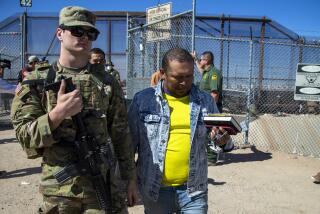Cuba’s Angola Troop Cut Doubted : Fresh Units Sent, Eroding Peace Accord, Rebels Assert
- Share via
WASHINGTON — Cuba is undermining a new southern Africa regional peace plan requiring complete withdrawal of its 50,000 or so soldiers from Angola by sending in fresh troops to replace at least some of those it has removed, U.S.-backed Angolan guerrillas charge.
Moreover, officials of Jonas Savimbi’s National Union for the Total Independence of Angola assert that at least some of the withdrawing Cuban troops have been sent to nearby African countries instead of returning to Cuba.
Jardo Muekalia, chief of UNITA’s Washington office, said that U.N. verification of the accord, signed Dec. 22, is so lax that President Fidel Castro’s Cuban government can violate it at any time.
“The accords will not be carried out unless the verification mechanism does its job,” Muekalia said in an interview. “Only 90 (U.N. monitors) are expected to verify the withdrawal of 50,000 or more troops in a country twice the size of Texas.”
U.N. Secretary General Javier Perez de Cuellar said he had received no formal complaints of violations of the pact.
“I have no reason for suspecting either side of violating the agreements,” he said.
Tony da Costa Fernandes, Savimbi’s second-in-command, has been in Washington for about a week trying to alert the Bush Administration to the dangers that UNITA sees in the verification procedure.
Muekalia said that State Department officials “have listened to us and taken our concerns into consideration.” But he said that UNITA has been unable to obtain a promise from the United States of any sort of action.
‘Cubans Coming Back’
“In the last two or three weeks, some Cubans have been coming back,” Muekalia said. He said that the Havana government describes the action as “normal rotation” of its forces.
“All anybody knows is the ships that took 3,000 (Cuban soldiers) out also brought some troops in,” Muekalia said. At the very least, he said, the rotation will make it far more difficult to determine the pace of the Cuban withdrawal.
Moreover, he said, the Cubans have sought permission to station some of the forces in the nearby African nations of Mozambique, Congo, Ghana, Ethiopia and Sao Tome and Principe. He said that Mozambique, Congo and Sao Tome and Principe “have already refused.” But he said the response of Ghana and Ethiopia is not yet clear.
Muekalia said some of the withdrawing troops have stopped in Ethiopia. Cuba says that the troops will continue the journey home after a brief stop but Muekalia said there will be no way to verify their departure from Ethiopia.
Cuba agreed to complete the withdrawal of its troops by July, 1991, as part of a complex, U.S.-brokered agreement among South Africa, Cuba and Angola’s leftist government. The pact calls for the first 3,000 troops to leave Angola by April 1, and Havana has reported that they already have left Angola to return to Cuba.
The pact also calls for South Africa to grant independence to Namibia, a sparsely populated territory on the southwestern coast of Africa that has been ruled by South Africa since 1920.
More to Read
Sign up for Essential California
The most important California stories and recommendations in your inbox every morning.
You may occasionally receive promotional content from the Los Angeles Times.













